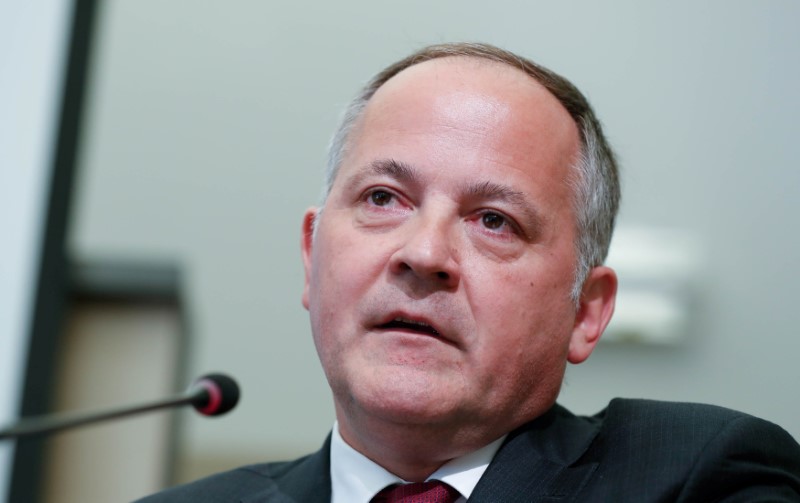By Francesco Canepa and Balazs Koranyi
FRANKFURT (Reuters) - The European Central Bank should not wait too long before paring back stimulus once it is convinced that inflation has recovered, and it could in theory increase rates early if necessary, ECB board member Benoit Coeure told Reuters.
With euro zone inflation now just under 2 percent and growth on its best run for years, the ECB is coming under pressure from Germany, the bloc's biggest economy, to start winding down its 2.3 trillion-euro (2 trillion pounds) bond-buying programme and start increasing its main policy rate, currently below zero.
In an exclusive interview, Coeure, a long-standing supporter of ECB President Mario Draghi's policy, said the bank should be ready to change its stance once economic conditions allow, or it risks a bigger financial blowback when it eventually does so.
"Too much gradualism in monetary policy bears the risk of larger market adjustments when the decision is eventually taken," Coeure said.
He added that the ECB should not put too much weight on political events like elections when deciding policy, a likely reference to elections in Germany in September and in Italy by May 2018.
While Coeure defended the bank's ultra-easy stance and policy guidance, he opened the door, at least in theory, to an increase in the bank's deposit rate even before bond purchases end, contrary to the bank's stated policy path.
His comments mark a departure from views expressed by Vice President Vitor Constancio and Chief Economist Peter Praet, two fellow Draghi allies who have advocated slow policy normalisation.
Inflation in the euro zone was 1.9 percent last month, in line with ECB's target. But it is expected to ease back in the coming months as the effect of a rebound in energy prices wane.
The ECB's policy-making Governing Council is due to meet on June 8 in Tallinn. No major change is expected beyond a slight tweak in the policy message to reflect an improvement in the economic outlook.
NOT SET IN STONE
Coeure stressed rate setters had yet to be convinced that the rebound in inflation was durable and that it would be sustained even once monetary support is withdrawn.
But he added the bank's future path, which currently foresees bond purchases until the end of year and rates at current or lower levels until well after that, was "not set in stone".
"In particular, it will be about the costs and benefits of having the very low and negative deposit facility rate that we have today," Coeure said. "It's not set in stone."
Banks have long complained that the negative rate, effectively a tax on the excess cash they park at the ECB, is squeezing their profits.
Coeure said so far the benefits of this tool outweighed its drawbacks. But he argued that, in the abstract, the deposit rate could be increased if it started to curb bank lending.
"That could be the case if we had strong evidence that the negative Deposit Facility Rate would impose a cost on the banking industry that ... could become a hindrance to our monetary policy transmission," he said.
So far, the ECB has kept the door open to even more rate cuts in its policy message. Financial markets, however, have long stopped expecting any cuts and currently anticipate some chances of a small rate hike next March.

Coeure would not be drawn on whether the reference to rate cuts may be removed, but he stressed the importance of keeping the bank's guidance "in line with facts".
"It's clear that the deflation risk is now off the table and that is also being acknowledged by financial markets," he said.
"One important consideration is to keep our forward guidance in line with facts."